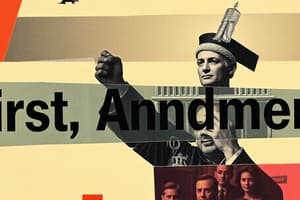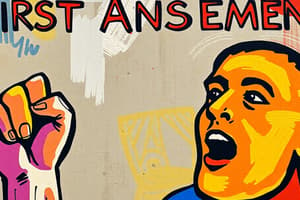Podcast
Questions and Answers
What does the First Amendment primarily protect?
What does the First Amendment primarily protect?
- The right to a fair trial
- The freedom to criticize the government (correct)
- The right to assemble peacefully
- The right to bear arms
Which of the following forms of communication is NOT protected by the First Amendment?
Which of the following forms of communication is NOT protected by the First Amendment?
- Internet communications
- Printed materials
- Violent threats (correct)
- Movies
Under what condition can the government restrict speech, according to the Brandenburg standard?
Under what condition can the government restrict speech, according to the Brandenburg standard?
- When it criticizes the government
- When it is likely to cause imminent violence (correct)
- When the speech is unpopular
- When it is said during a war
What action does the First Amendment NOT protect in public schools?
What action does the First Amendment NOT protect in public schools?
What historical action did the Federalist Congress take in 1798 regarding free speech?
What historical action did the Federalist Congress take in 1798 regarding free speech?
Who challenged the Alien and Sedition Acts in their states' resolutions?
Who challenged the Alien and Sedition Acts in their states' resolutions?
What was the ruling of the Supreme Court in Brandenburg v. Ohio?
What was the ruling of the Supreme Court in Brandenburg v. Ohio?
Which of the following is an example of symbolic expression protected by the First Amendment?
Which of the following is an example of symbolic expression protected by the First Amendment?
What is one limitation to student speech in a school-sponsored platform?
What is one limitation to student speech in a school-sponsored platform?
What can the government not do regarding speech, as outlined by the First Amendment?
What can the government not do regarding speech, as outlined by the First Amendment?
What was the reason for Matthew Lyon's conviction?
What was the reason for Matthew Lyon's conviction?
Which event followed the election of Thomas Jefferson in 1800 regarding freedom of expression?
Which event followed the election of Thomas Jefferson in 1800 regarding freedom of expression?
What was the main issue in the Tinker v. Des Moines case?
What was the main issue in the Tinker v. Des Moines case?
What action did school officials take in response to the Tinkers' planned protest?
What action did school officials take in response to the Tinkers' planned protest?
What did the Tinker family believe regarding the treatment of their children?
What did the Tinker family believe regarding the treatment of their children?
What was the outcome of the lower courts' decisions in the Tinker case?
What was the outcome of the lower courts' decisions in the Tinker case?
What year did the Tinker case reach the Supreme Court?
What year did the Tinker case reach the Supreme Court?
What was one of the main arguments made by the Tinkers' lawyer during the Supreme Court proceedings?
What was one of the main arguments made by the Tinkers' lawyer during the Supreme Court proceedings?
Why did the Tinkers suspend their protest after New Year's Day in 1965?
Why did the Tinkers suspend their protest after New Year's Day in 1965?
What significant right is highlighted in relation to the outcome of the Tinker case?
What significant right is highlighted in relation to the outcome of the Tinker case?
What consequence did Matthew Lyon face for criticizing President Adams in his letter?
What consequence did Matthew Lyon face for criticizing President Adams in his letter?
What did the students in the Tinker case wear to protest the Vietnam War?
What did the students in the Tinker case wear to protest the Vietnam War?
What action did school officials take when they learned about the Tinkers' planned protest?
What action did school officials take when they learned about the Tinkers' planned protest?
What was one argument made by the Tinkers' lawyer in support of their case?
What was one argument made by the Tinkers' lawyer in support of their case?
What was the outcome of the lower courts' rulings before the case reached the Supreme Court?
What was the outcome of the lower courts' rulings before the case reached the Supreme Court?
Why did Matthew Lyon run for reelection from jail?
Why did Matthew Lyon run for reelection from jail?
What significant legal principle was at stake in the Tinker case?
What significant legal principle was at stake in the Tinker case?
What did Adams refuse to do for Matthew Lyon after his reelection?
What did Adams refuse to do for Matthew Lyon after his reelection?
What year did the Tinker v. Des Moines case reach the Supreme Court?
What year did the Tinker v. Des Moines case reach the Supreme Court?
What was the main result of the 1800 election in relation to freedom of expression?
What was the main result of the 1800 election in relation to freedom of expression?
What does the First Amendment protect regarding communication?
What does the First Amendment protect regarding communication?
How does the government’s ability to restrict speech relate to imminent violence?
How does the government’s ability to restrict speech relate to imminent violence?
Which of the following best describes the Brandenburg standard?
Which of the following best describes the Brandenburg standard?
What was a primary argument against the Alien and Sedition Acts?
What was a primary argument against the Alien and Sedition Acts?
What type of expression can students freely engage in at school unless disruptive?
What type of expression can students freely engage in at school unless disruptive?
In what situation may students' expression be more restricted in schools?
In what situation may students' expression be more restricted in schools?
What was the central issue during the conflict over the Alien and Sedition Acts?
What was the central issue during the conflict over the Alien and Sedition Acts?
What was the outcome of the Supreme Court case regarding Brandenburg?
What was the outcome of the Supreme Court case regarding Brandenburg?
Which historical document did Jefferson and Madison use to argue against the Alien and Sedition Acts?
Which historical document did Jefferson and Madison use to argue against the Alien and Sedition Acts?
Which scenario illustrates a restriction on free speech in a public school?
Which scenario illustrates a restriction on free speech in a public school?
Flashcards are hidden until you start studying
Study Notes
First Amendment Overview
- Protects the freedom of speech and expression concerning government criticism, including war and taxation.
- Encompasses various forms of communication: speech, print, film, broadcasting, and internet.
- Includes symbolic expressions: banners, flag-burning, and armbands.
Student Speech Rights
- Public school students can express opinions unless disruptive.
- Restrictions apply on school-sponsored platforms (e.g., school newspaper) with more deference to school officials.
Brandenburg Standard
- Government restrictions on speech are limited to instances likely to incite imminent violence.
- Based on the Supreme Court case Brandenburg v. Ohio, where a KKK leader's conviction was reversed.
- Requirement: speech must be directed to inciting imminent lawless action and likely to cause such action.
Historical Context: Alien and Sedition Acts
- In 1798, during John Adams' presidency, the Federalist Congress enacted four laws to prevent criticism amid war fears.
- Laws enabled the arrest and deportation of critics and foreigners during wartime.
- Thomas Jefferson and James Madison argued these acts were unconstitutional through state resolutions.
- Matthew Lyon, a Congressman jailed for criticism of Adams, won reelection from prison, reflecting public support for free expression.
Tinker v. Des Moines Case
- In 1965, students Mary Beth Tinker, John Tinker, and Christopher Eckhardt protested the Vietnam War by wearing black armbands.
- School officials prohibited armbands, leading to the students' suspension when they protested the ban.
- The Tinker family argued this was a violation of First Amendment rights, emphasizing that children retain free speech rights at school.
- Lower courts ruled in favor of the school, citing the authority to maintain order.
- Appeal to the Supreme Court initiated in 1968, highlighting the principle that "the First Amendment rights of children are not shed at the schoolhouse gate."
First Amendment Overview
- Protects the freedom of speech and expression concerning government criticism, including war and taxation.
- Encompasses various forms of communication: speech, print, film, broadcasting, and internet.
- Includes symbolic expressions: banners, flag-burning, and armbands.
Student Speech Rights
- Public school students can express opinions unless disruptive.
- Restrictions apply on school-sponsored platforms (e.g., school newspaper) with more deference to school officials.
Brandenburg Standard
- Government restrictions on speech are limited to instances likely to incite imminent violence.
- Based on the Supreme Court case Brandenburg v. Ohio, where a KKK leader's conviction was reversed.
- Requirement: speech must be directed to inciting imminent lawless action and likely to cause such action.
Historical Context: Alien and Sedition Acts
- In 1798, during John Adams' presidency, the Federalist Congress enacted four laws to prevent criticism amid war fears.
- Laws enabled the arrest and deportation of critics and foreigners during wartime.
- Thomas Jefferson and James Madison argued these acts were unconstitutional through state resolutions.
- Matthew Lyon, a Congressman jailed for criticism of Adams, won reelection from prison, reflecting public support for free expression.
Tinker v. Des Moines Case
- In 1965, students Mary Beth Tinker, John Tinker, and Christopher Eckhardt protested the Vietnam War by wearing black armbands.
- School officials prohibited armbands, leading to the students' suspension when they protested the ban.
- The Tinker family argued this was a violation of First Amendment rights, emphasizing that children retain free speech rights at school.
- Lower courts ruled in favor of the school, citing the authority to maintain order.
- Appeal to the Supreme Court initiated in 1968, highlighting the principle that "the First Amendment rights of children are not shed at the schoolhouse gate."
Studying That Suits You
Use AI to generate personalized quizzes and flashcards to suit your learning preferences.




